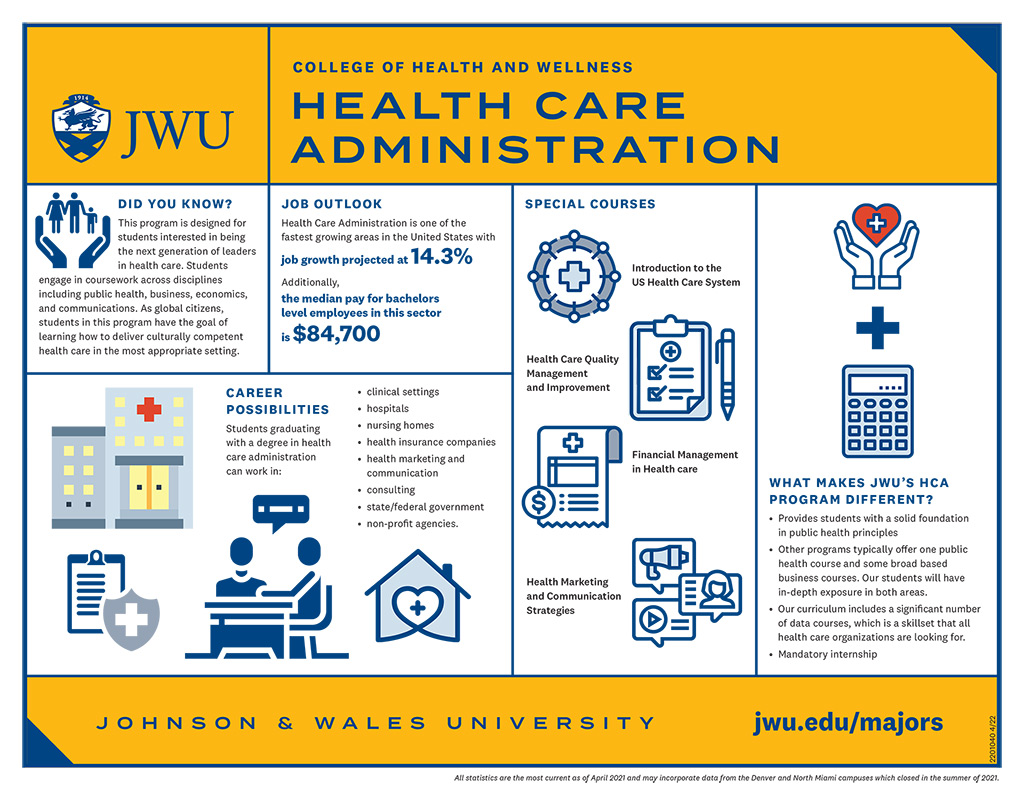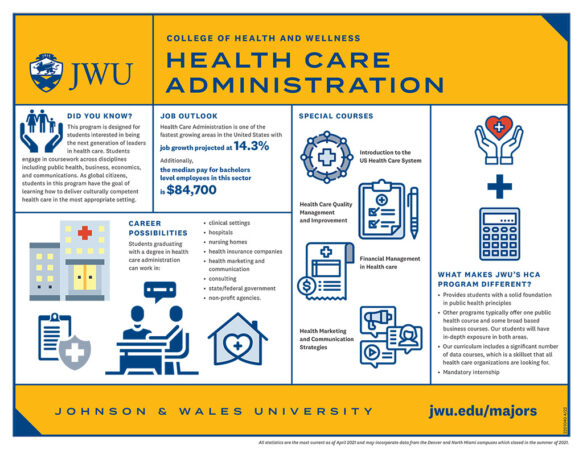
Overview of Bachelor of Science in Health Administration (BSHA)
The Bachelor of Science in Health Administration (BSHA) is a specialized degree program designed to equip students with the knowledge and skills necessary to manage and lead healthcare organizations effectively. The curriculum focuses on the administrative, financial, and operational aspects of healthcare, providing a comprehensive understanding of the industry and its challenges.
Typical Curriculum
The BSHA curriculum typically includes coursework in:
- Healthcare Management
- Healthcare Finance
- Healthcare Law and Ethics
- Healthcare Information Systems
- Healthcare Operations
- Public Health
- Healthcare Policy
Career Opportunities
Graduates with a BSHA can pursue a wide range of career opportunities in healthcare administration, including:
- Hospital Administrator
- Clinic Manager
- Healthcare Consultant
- Healthcare Policy Analyst
- Healthcare IT Manager
- Health Insurance Administrator
- Medical Office Manager
Core Concepts in Health Administration
Health administration encompasses the principles and practices of managing healthcare organizations and systems. It involves planning, organizing, leading, and controlling healthcare delivery to ensure efficient, effective, and equitable healthcare services.
Healthcare administrators play a pivotal role in ensuring the smooth functioning of healthcare organizations. They oversee various aspects of healthcare management, including financial planning, resource allocation, human resources management, quality improvement, and patient safety. They collaborate with healthcare professionals, policymakers, and stakeholders to develop and implement policies, programs, and initiatives that enhance healthcare outcomes.
Key Challenges and Trends in Healthcare Administration
The healthcare industry is constantly evolving, presenting numerous challenges and trends that healthcare administrators must navigate. These include:
- Rising healthcare costs: Healthcare costs continue to rise, putting pressure on healthcare organizations to find ways to reduce expenses while maintaining quality of care.
- Increasing demand for healthcare services: As the population ages and chronic diseases become more prevalent, the demand for healthcare services is increasing, straining healthcare resources.
- Technological advancements: Rapid advancements in technology are transforming healthcare delivery, presenting both opportunities and challenges for healthcare administrators.
- Changing regulatory landscape: The healthcare industry is heavily regulated, and changes in regulations can significantly impact healthcare organizations.
- Focus on value-based care: There is a growing emphasis on value-based care, which aims to provide high-quality healthcare at a lower cost.
Healthcare administrators must stay abreast of these challenges and trends and develop innovative strategies to address them effectively. They must also be adaptable and resilient in the face of constant change.
Essential Skills for Health Administrators
Health administrators are responsible for the efficient and effective operation of healthcare organizations. They must possess a diverse set of skills to lead, manage, and make ethical decisions in a complex and ever-changing healthcare landscape.
Leadership and Management Skills
Effective health administrators possess strong leadership and management skills. They are able to:
- Develop and implement strategic plans
- Manage budgets and financial resources
- Hire, train, and motivate staff
- Negotiate contracts with vendors and insurers
- Resolve conflicts and build consensus
Communication, Interpersonal, and Analytical Skills
Health administrators must be able to communicate effectively with a wide range of stakeholders, including patients, families, staff, and policymakers. They must also possess strong interpersonal skills to build relationships and collaborate with others. Additionally, they must have analytical skills to interpret data, identify trends, and make informed decisions.
Ethical Considerations
Health administrators face a variety of ethical challenges in their work. They must be able to make decisions that are in the best interests of patients, staff, and the organization. They must also be aware of the legal and regulatory requirements that govern healthcare administration.
Ethical considerations in healthcare administration include:
- Patient confidentiality
- Informed consent
- End-of-life care
- Conflicts of interest
- Resource allocation
Specializations in Health Administration

The BSHA program offers several specializations that allow students to tailor their education to their career goals. These specializations provide in-depth knowledge and skills in specific areas of health administration, preparing graduates for leadership roles in healthcare organizations.
Each specialization has unique career paths and opportunities. Graduates with a specialization in Health Policy and Management may pursue careers in government agencies, healthcare advocacy organizations, or health insurance companies. Those specializing in Healthcare Finance may find opportunities in financial management, budgeting, and reimbursement analysis. Specializations in Healthcare Informatics and Information Management prepare graduates for roles in health data analysis, information systems management, and healthcare technology implementation.
The key skills and knowledge required for each specialization vary depending on the focus area. For instance, Health Policy and Management requires a strong understanding of healthcare policy, regulatory compliance, and stakeholder engagement. Healthcare Finance specialization emphasizes financial management principles, budgeting techniques, and healthcare reimbursement models. Healthcare Informatics and Information Management require expertise in health data analysis, information systems, and healthcare technology.
Career Outlook for Health Administrators
Health administrators are in high demand due to the growing complexity of healthcare systems and the increasing need for efficient and effective healthcare management. The job market for health administrators is expected to continue to grow in the coming years, driven by factors such as the aging population, the rising prevalence of chronic diseases, and the increasing adoption of technology in healthcare.
Projected Growth and Demand
According to the U.S. Bureau of Labor Statistics, the employment of health administrators is projected to grow 18% from 2021 to 2031, much faster than the average for all occupations. This growth is expected to result in the addition of approximately 50,600 new jobs over the decade.
Earning Potential and Career Advancement
Health administrators can earn a substantial salary. According to the U.S. Bureau of Labor Statistics, the median annual salary for health administrators was $104,280 in May 2021. The top 10% of earners made more than $167,340, while the bottom 10% earned less than $58,370.
Health administrators have the opportunity to advance their careers in a variety of ways. They can move into more senior management positions, such as chief executive officer or chief operating officer. They can also specialize in a particular area of healthcare, such as finance, operations, or human resources.
Choosing the Right BSHA Program
Selecting the right Bachelor of Science in Health Administration (BSHA) program is crucial for your future career. Here are some key factors to consider:
Accreditation
Accreditation ensures that a program meets established quality standards. Look for programs accredited by the Commission on Accreditation of Healthcare Management Education (CAHME). Accredited programs provide a rigorous curriculum, qualified faculty, and industry-relevant experiences.
Faculty Expertise
The faculty’s expertise and experience are vital. Check the qualifications of the professors, their research interests, and their connections within the healthcare industry. Strong faculty can provide valuable mentorship and insights.
Program Reputation
Consider the program’s reputation within the healthcare community. Reach out to alumni and industry professionals to gather feedback on the program’s effectiveness and its graduates’ success.
Finding and Applying to BSHA Programs
* Research potential programs thoroughly.
* Visit program websites and attend virtual or in-person information sessions.
* Contact the program directors or admissions offices with specific questions.
* Gather required application materials, including transcripts, letters of recommendation, and personal statements.
* Meet application deadlines and submit a well-written and comprehensive application package.





